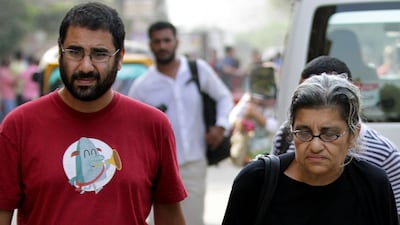Egyptian authorities have dismissed allegations of torture and other violations against a prominent activist serving a five-year prison term as "baseless".
A statement from general prosecution office said complaints by Alaa Abdel Fattah’s family that he was denied visits and proper medical care were found to be untrue after an investigation.
“He has received eight visits by his mother, sisters and other relatives,” said the statement released late on Thursday. "They brought him food during some of these visits. The last visit was by his mother on July 16."
The office said Abdel Fattah was receiving "regular medical checks", from which it had been concluded that he did not suffer from any medical problems.
Abdel Fattah, a computer programmer by profession, was a central figure in Egypt’s 2011 uprising that forced former president Hosni Mubarak to step down. He was sentenced to five years in prison in 2015 for participating in an illegal street protest.
He was released in March 2019 but was arrested again in September that year and remained in pretrial detention until last December when he received a five-year prison term for “spreading false news”.
He is serving his current sentence at the new Wadi El Natroun prison complex north-west of Cairo, a modern jail to which he was transferred this year from a notorious maximum security prison in a suburb south of Cairo, the Egyptian capital.
Abdel Fattah’s case has routinely figured in criticism of Egypt by domestic and western rights groups. His case has gained even more prominence under growing scrutiny in the run-up to the global climate change Cop27 conference due to be held in Egypt in November.
The government of President Abdel Fattah El Sisi, a former army general elected in 2014, has recently taken steps to improve its dealing with dissent, releasing dozens of critics held in pretrial detention and announcing plans for a national dialogue to which opposition parties have been invited to chart the country’s political and economic future.
Abdel Fattah’s family say he has been on hunger strike since April in protest against prison conditions.
His mother and two sisters say he has also been denied consular visits by the British Embassy in Cairo to which he is entitled since he and his siblings obtained British citizenship this year. Their mother, mathematics professor Laila Souef, was born in Britain in 1956.
However, the prison authorities have yet to see proof of that, the prosecution statement said.
There was no immediate reaction from Abdel Fattah's family to the statement.
The prosecution also quoted the deputy governor of the Wadi El Natroun prison complex as saying Abdel Fattah was regularly receiving meals, visits and exercise time.
Abdel Fattah’s cell, which he shares with three inmates, was inspected on Wednesday by an investigating judge from the prosecution, said the statement. It was found to be adequately ventilated and well-lit, it said. Abdel Fattah also keeps a large number of books and magazines in different languages, it added.
In reply to the judge’s questions, Abdel Fattah said he had no complaints about his living conditions in prison, according to the statement.
“A physical examination showed no bodily injuries that suggest he was subjected to torture,” it said.

